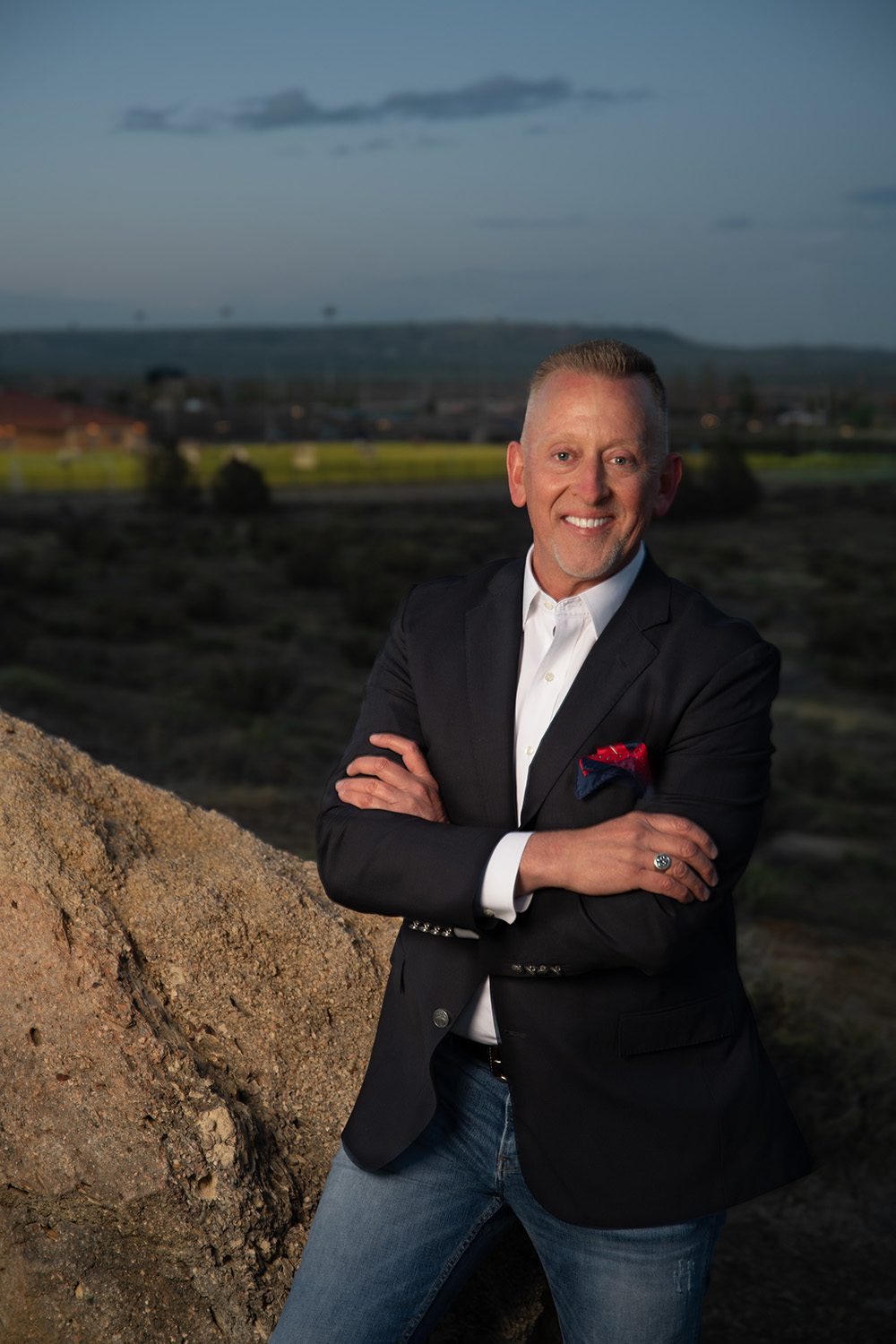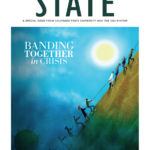President Timothy Mottet Envisions a Vibrant Future for CSU-Pueblo
Timothy Mottet promotes the need to both manage and lead. That means handling current operations and challenges, while also envisioning and actively planning for a well-defined future marked by growth and innovation; It means tending to current and future states at once.
The philosophy has particular meaning at the institution he heads: Mottet is president of Colorado State University-Pueblo, a job he began in 2017 after holding top leadership roles at Northwest Missouri State University in Maryville and Texas State University in San Marcos.
CSU-Pueblo was established as a community college in 1933 and became a four-year residential university in 1965. It joined the CSU System in 2003, and now has about 4,000 students pursuing bachelor’s degrees and master’s degrees in fields including business, communications, engineering, nursing, science, social work, teaching, and technology. This year, the university is launching its first doctoral degree program, in nursing practice, a benchmark that reflects a campus goal of offering more robust graduate programs designed to prepare students for high-level responsibilities in high-demand fields.
Yet the evolution of CSU-Pueblo into a regional comprehensive university – one that prepares students for professional careers in its region – has presented ups and downs, as occurs at every institution undergoing change.
Recent enrollment declines at CSU-Pueblo have resulted in an anticipated budget deficit of $3 million in the fiscal year that begins next month; that, in turn, has triggered difficult cost reductions, including hiring freezes and several layoffs from an employment base that includes about 500 full-time faculty and staff. Managing costs in the face of a deficit presents “a challenging time for everyone,” Mottet acknowledged in a letter to campus.

“I’ve spent my career at regional comprehensives, and it’s truly inspiring to see the upward mobility of our students, in terms of their growth and what that growth positions them to achieve in their communities.”
– Timothy Mottet, President, Colorado State University-Pueblo
At the same time, Mottet is leading an ambitious plan for the future of CSU-Pueblo; when fully enacted, it would reverse current struggles. Unveiled last year, Vision 2028 seeks, in the course of a decade, to remake CSU-Pueblo as “the people’s university of the Southwest” – a regional comprehensive university that will draw students from the Southwestern United States and deliver professionals back to the region ready to navigate work in a rapidly changing world. The vision recommits CSU-Pueblo to developing systems and competencies that allow students to have meaningful impacts on their work, families, and communities.
Vision 2028 includes new and retooled financial aid, academic support, advising, and general-education programs designed to boost student retention, graduation, and job placement on a campus whose enrollment comprises 35 percent first-generation students and nearly 50 percent minority students.
The plan also encompasses a web of close connections to high schools, area community colleges, and economic development efforts, reflecting the university’s vital role in the region it serves. “Our new vision recommits us to people and community, which reflects our DNA and provides us with an opportunity to reimagine what a university and community can accomplish together,” Mottet said when he announced Vision 2028 last fall. “We want our partnership to reposition us in Colorado and the Southwestern United States, which is home to 90 percent of our students. It’s going to take a decade to transform the university.”
As the plan unfolds, Mottet is working to build a culture that celebrates academic achievement. To that end, CSU-Pueblo in May brought graduation ceremonies back to campus after holding commencement for more than two decades at an events center on the Colorado State Fairgrounds; more than 5,000 people attended to cheer about 1,000 graduates. Graduation day, on the first Saturday in May, was a workday for all university employees (who had the following Monday off); commencement ceremonies were capped by an all-employee picnic. “We’re trying to create rituals, ceremonies, and culture on this campus,” Mottet explained. “It’s time for us to enjoy some of the pomp, circumstance, and traditions that higher education prides itself on. We need to celebrate the work we’ve done collectively.”
In a recent discussion with State magazine, Mottet described other important characteristics of CSU-Pueblo and Vision 2028.
STATE: What is the connection between Vision 2028 and CSU-Pueblo’s classification as a regional comprehensive university?
MOTTET: Vision 2028 arises from that identity. We are working to transform CSU-Pueblo into the people’s university of the Southwest within 10 years, a goal that, at its core, fully reflects our role as a regional comprehensive university. Regional comprehensives have often been called “people’s universities” because they serve underrepresented populations and are historically focused on workforce development for specific regions.
I’ve spent my career at regional comprehensives, and it’s truly inspiring to see the upward mobility of our students, in terms of their growth and what that growth positions them to achieve in their communities.
At CSU-Pueblo, there is an elegant connection between our university’s role and our hometown because the Latin root of “Pueblo” means “people.” So it’s especially meaningful for CSU-Pueblo to reinvigorate its role as the people’s university and to become a more forceful economic driver delivering knowledgeable and well-prepared graduates to our region.
STATE: What are some of the specific pillars of Vision 2028?
MOTTET: One of the most important is educational access and affordability for our students. We’ve got to be much more innovative about creating multiple access points and financial-aid opportunities to get students into higher education. This is fundamental in our ability to attract, retain, and graduate students. Financial aid is also critical to their ability to return to the region after graduation. That’s because we’re in a region with low median incomes. So students, first, must be able to afford higher education, and, second, must be able to pay off college loans, if they have them, in order to live, work, and raise families in our region. Of course, all of these issues are closely tied to regional economic development. To achieve that regional outcome, we’ve got to successfully address these interrelated issues of access and affordability.
Vision 2028 also seeks to create a unique set of experiences for our students. It is concerned with our campus environment, our physical spaces, infrastructure, and technology. And then, the fourth pillar driving the concept of people’s university is professional development for our employees, which is also intrinsic to institutional health, the student experience, and regional vibrancy.
STATE: In 2002, the U.S. Department of Education designated CSU-Pueblo as a Hispanic-Serving Institution, meaning at least 25 percent of its enrollment is made up of Hispanic students. Why is that designation significant for CSU-Pueblo, and how is it connected to Vision 2028?
MOTTET: Our student population is now 34 percent Hispanic and close to 50 percent minority overall, a point of pride for us as a reflection of the demographics in our community and region. There are multiple identities and cultures wrapped into the term “Hispanic,” but for us the designation is part of our ethos and our mission to serve all students from underrepresented groups.
There are more than 400 colleges and universities nationwide with the HSI designation, including several in Colorado. The designation is important in part because it makes us eligible for federal grant money to develop academic programs that help recruit, retain, and graduate Hispanic students and others with diverse backgrounds.
CSU-Pueblo currently has three such projects underway, funded by a total of $10 million in federal awards. One program recruits students into STEM fields, with an emphasis on new and redesigned course work, hands-on research projects, and mentoring. Another has established a Center for Teaching and Learning, with innovative programs to promote academic success among students from underrepresented groups. A third creates important pathways between Pueblo Community College and our campus, which builds our entire ecosystem of achievement.
STATE: Vision 2028 also seeks to enhance community and regional connections through a concept described as “engaging place.” What does that mean and why is it important for students and the region?
MOTTET: We want to embrace the defining characteristics of southern Colorado and the Southwestern United States, including our region’s unique and sometimes difficult history, its rich and nuanced cultures, and its longtime focus on work and a strong work ethic. If we can help students more fully understand and appreciate this backdrop – this place – then we are adding value to their degrees and helping students build cultural competencies that will enrich their lives and advance their careers in our region.





